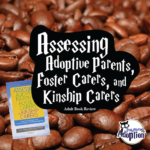Assessing Adoptive Parents, Foster Carers, and Kinship Carers is a detailed guide for social workers and other professionals on essential characteristics for prospective foster carers and adoptive parents and how to assess them. This book provides an overview of the effects of developmental trauma, as well as detailing the social, psychological, developmental, and even neuropsychological characteristics of a successful adoptive parent or foster carer. Each chapter is written by experts in the field and covers a relevant component of parenting. The chapters cover the science behind why this particular component is relevant in caring for children with developmental trauma, and how it can be assessed during the interview process. While covering a wide range of parenting topics the book provides deep dives into child and adult attachment styles, reflective functioning, and PACE (Playfulness, Acceptance, Curiosity, and Empathy) parenting.
I found that this book provided many opportunities for self-reflection, particularly in how one’s childhood impacts adult social relationships. There were many moments in this book when reflecting on my own childhood helped me make connections between past experiences and parenting behavior. This self-reflection is essential not only for prospective adoptive parents and foster carers, but for social workers and professionals who assess these prospective carers. The book emphasizes that our experiences impact all interactions, including how we as professionals approach prospective adoptive parents and foster carers. Though several of the chapters focused on UK policies and procedures, as a US reader, I still found the book to be relevant. There may be some differences between the UK and US systems of assessing prospective carers, but the fundamentals of assessing parenting capacity remain the same.
Because each chapter is written by a different set of experts, there is some overlap in the information presented in the book. This book might benefit from reorganization, as some of the concepts discussed in earlier chapters are not fully defined until later chapters. It may be helpful to read chapters 6, 7, and 9 after chapter 4 instead of the designated order.
Overall, this book provides valuable information for professionals and social workers in the child welfare system, but also may provide insight for prospective or current foster and adoptive parents who are interested in…
[Read Full Review – Standard and Premium Members Only]
About the Reviewer:
Julie is a Central Virginia native who currently resides in Rochester, New York. She received her Masters of Arts Degree in Psychology from the College of William and Mary in 2012 and is currently a PhD candidate in Epidemiology at the University of Rochester. Julie has worked in various mental health research positions since 2012 and is passionate about researching how physical health, mental health, and trauma experiences interact. When not working, Julie enjoys reading, cooking, spending time with her cats, and watching videos about otters (her favorite animal).
**Transfiguring Adoption is a nonprofit organization seeking to nurture growth in foster and adoptive families by giving a HOOT about their families. Transfiguring Adoption does not intend for its reviewers nor its review to be professional, medical or legal advice. These reviews and discussion guides are intended to help parents to better be able to connect and understand their children who come from traumatic backgrounds.
